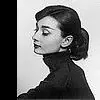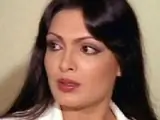Remains of a beautiful mind
When Babi, who had been diagnosed with paranoid schizophrenia, died in January 2005 at the age of 56 without a named heir, the government of Maharashtra became her custodian. One room of the Juhu house has her valuable possessions locked away. Assorted jewellery, a Husain painting titled Short Story, artefacts, costumes, all neatly inventoried. What was moved out of the flat was what the government thought unimportant - her thoughts.
In a typical government office supported by crumbling grey files sits a forlorn cardboard box on a dusty table. In it are at least 20 foolscap notepads engorged with writing, and in ironic contrast, a lobotomised computer without its hard disk. That brain has been separately sealed by the government - technology must be treated with respect. Not in the box but somewhere in that office are stashes of microtape. In the last four years of her life, Babi recorded every phone call, always punctiliously informing the caller about surveillance.
There are old VCR tapes of her films, like Khuddar and Suhag western classical music CDs and pop songs, and other CDs carefully labelled with dates. It is clear from the notepads that Babi was an obsessive documenter of her daily activities and thoughts.
One CD is chockful of the cases she filed against Sanjay Dutt, the US government, Tony Blair, the then BJP government, and Amitabh Bachchan who, she said, had tried to kill her. A neighbour said that when a Bachchan film was shown on cable television, the actress reacted violently and had to be calmed. She wrote that she feared her death at the hands of "well known personalities" and had therefore prepared a will and made her spiritual guru and friend U G Krishnamurthy the beneficiary.
Every material object in the house is entered: three television sets, two refrigerators, two videos, two tape deck stereos, six large speakers, nine Kashmiri carpets, diamond and pearl jewellery, one 3X 21/2 foot painting by B Prabha from Pundole Art Gallery with a woman and her two children, two M F Husain Varanasi prints, two term deposits of Rs 17,25,848 at HDFC Bank, Khar branch. All this in a file titled: "Most important documents of Ms Parveen Babi".
Her English is fluid, her thoughts get snagged on hooks of suspicion and doubt and go into repeat. Her writing is cursive, rounded and crowded. What shines through is the meticulousness, say, in the planning of an event. A few months before she died, Babi hosted a small party at her Juhu flat.
The names of the seven guests are listed, one of them is Rev Avinash (Babi was reportedly baptised in 1997 and worshipped at the All Saints Church on Malabar Hill). The French dishes on the menu are listed and next to them is a series of reminders: "Call caterer for knives, forks, glasses, spoons." "Get four bakery cakes." "Clean plates, table cloths." "Call florist. Clean and prepare salad ingredients." And finally: "Asparagus".
On another page she grumbles about the gender discrimination in Bollywood. "Acting for an Indian actress often meant doing a few romantic scenes with the leading man, a few dances, and one or two scenes where the actress had to shed very visible large tears."
Parveen Babi was the first Indian actress to make it to the cover of Time . The arclights caressed her then the way they do the young actresses of today. At a New York airport in 1984, she had a breakdown when asked to show her papers, had to be ankle-cuffed and taken to a hospital. She came back to Juhu with Krishnamurthy's help. She filed court cases, and fought them herself, appearing in dark glasses. She wrote and died on her own terms. So what if there was no one to shed very visible large tears?




























4